Wales One World Film Festival: Cockle women remembered
- Published
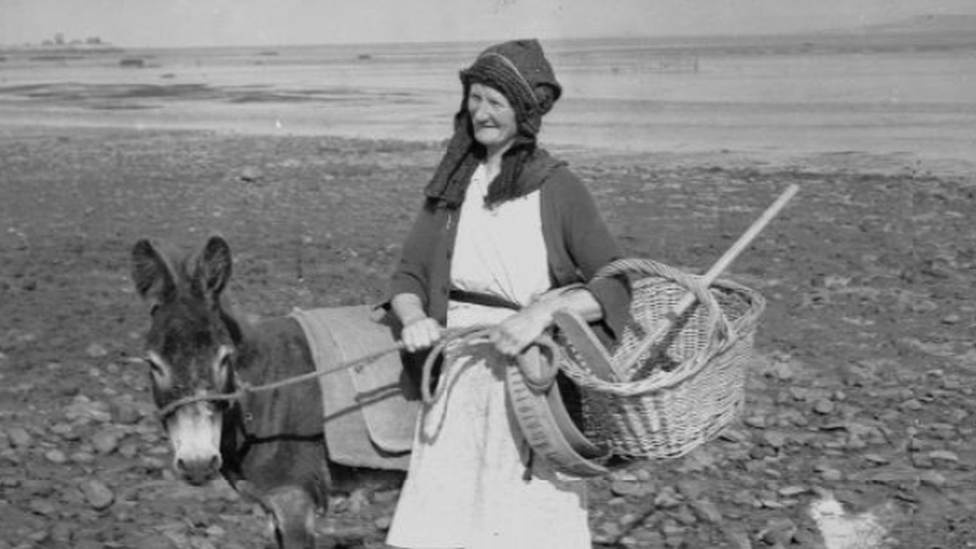
Cockle women dressed in flannel gowns with their donkeys and wicker baskets were once a familiar sight along parts of the south Wales coast.
At its height in the19th Century, hundreds of women could be seen on the sandy flats at low tide gathering cockles.
Generations of women carried out the back-breaking and dangerous work but they are now long gone, replaced by mostly men using tractors or 4x4s.
These women from a bygone time, alongside women who still work in Wales' shellfish industry, have been celebrated in a short film being shown at the Wales One World Film Festival.
"These women were pretty incredible and so strong and resilient," said the film's director Lily Tiger Tonkin-Wells.
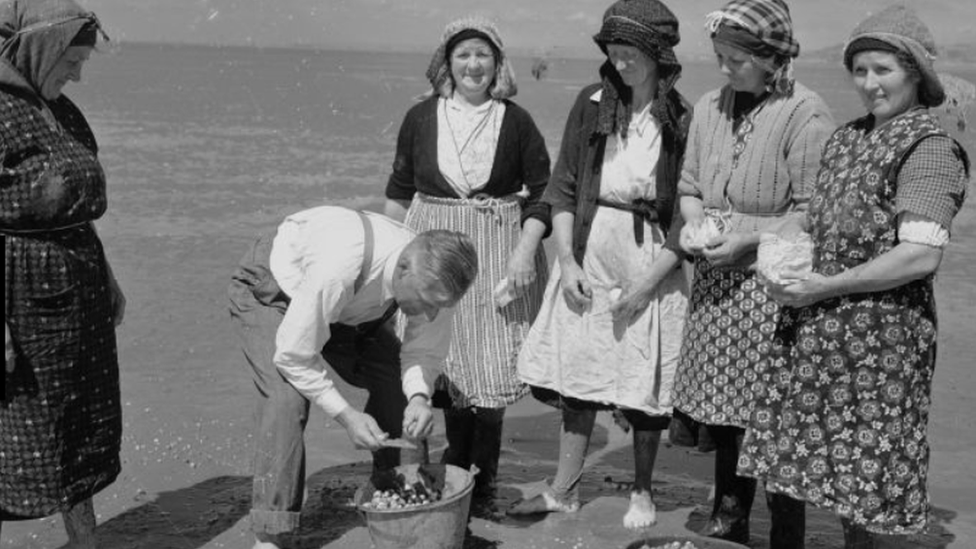
Women collecting cockles in Penclawdd on the Gower Peninsula in 1951
She said while sourcing archive footage for She Sells Shellfish / Molysgiaid a Menywod y Môr she was struck by the "stunning imagery" of the women.
"These women were holding cockle baskets on their heads, piling them onto the donkeys with their skirts up around their their ankles while wading through the water," she said.
"The main thing that I was really captivated by was that these very hardy, hard-working women really understood the tides and the way the water worked and when to go out and when to come back into shore."
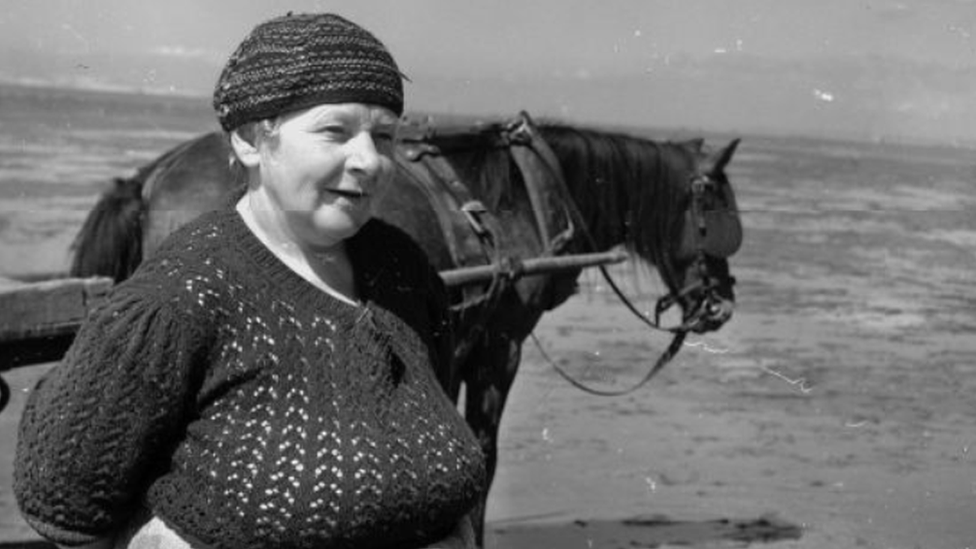
Penclawdd cockles have been present in the Burry estuary in south Wales since Roman times
Since Roman times an organised commercial fishery has existed on both shores of the Burry inlet, which runs between the Gower peninsula in Swansea county and Llanelli in Carmarthenshire.
Throughout the 19th Century women would gather to rake for cockles at Penclawdd on the Gower peninsula..
They would pack their cockles into sacks, load them onto their donkeys and wash and boil them in small sheds behind their homes.
Before the arrival of the train in 1867 the women would make the round trip of 16 miles (26km) to Swansea Market on foot. Others would sell their wares door-to-door.
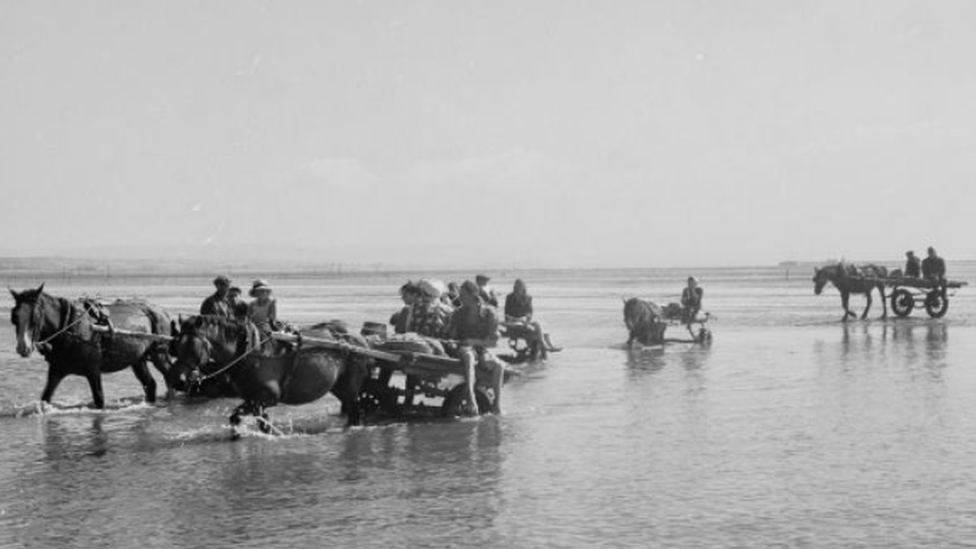
Penclawdd has been synonymous with the cockle industry since Roman times
The money they brought in would be a welcome addition to their husbands' income, usually from work in the steel or coal industries.
The traditional method of transporting cockles from the beds using donkeys was superseded in the 1920s with the introduction of horse-drawn carts.
Then in 1965 a government decree was passed, permitting only licensed gatherers to hand-pick the cockles with limited quotas.
Images of these cockle women evoke nostalgia of a less industrialised way of life with their distinctive clothing making them a popular subject for paintings, prints and photographs.
Lily was also struck by their aesthetic.
"They would put effort into how they looked, which I thought was really brilliant as it's this kind of third wave of feminism which is, 'yeah, like we're gonna look great'," she said.
The film, shot in black and white on super 8mm, blends archive footage with new footage of women working in Wales' shellfish industry today.
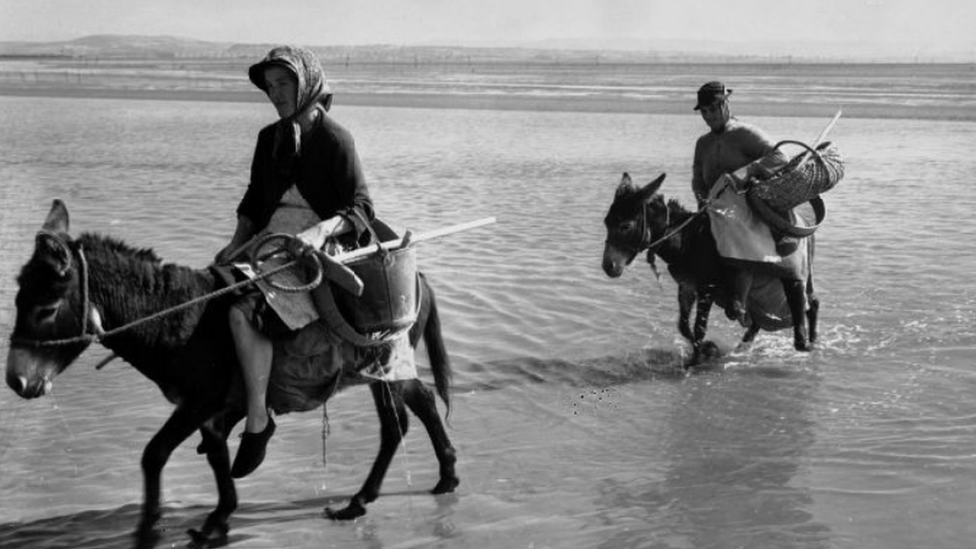
The women would use donkeys to help them bring the cockles ashore
Carol Watts has been selling Penclawdd cockles and laverbread at Swansea Market all her working life.
She has fond memories of riding with the cockles on a horse and cart as a child.
Her great-grandmother Margaret Phillips was a cockle picker and was still harvesting when she was in her 80s.
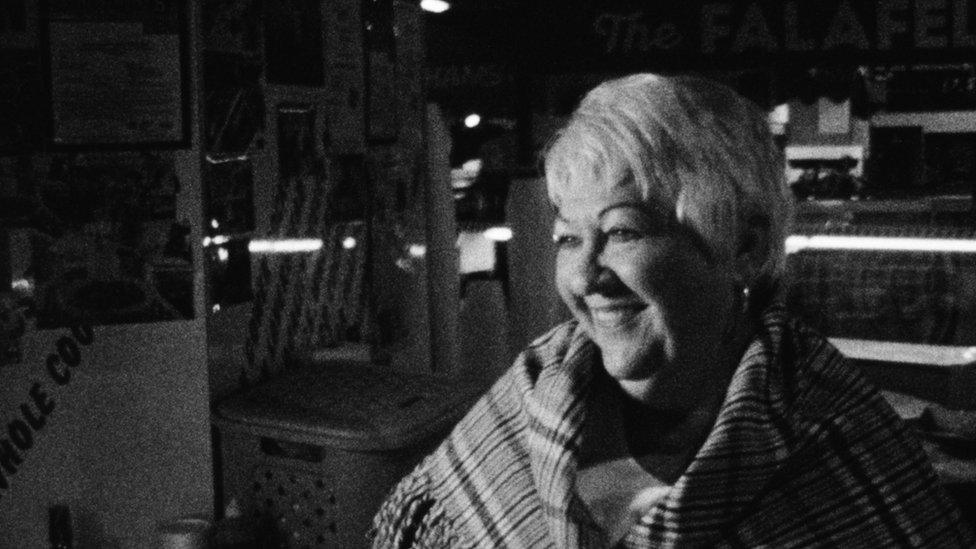
Cockle seller Carol has worked in Swansea Market all her working life
Margaret's cockling was her family's only source of income after her husband died in his 20s, leaving her to raise their young children alone.
Carol, who appears in the film, said: "It was very, very hard to gather the cockles.
"It was rough, very back-breaking, very wet, a hard job.
"The women did it to put bread on the tables, things were tough."
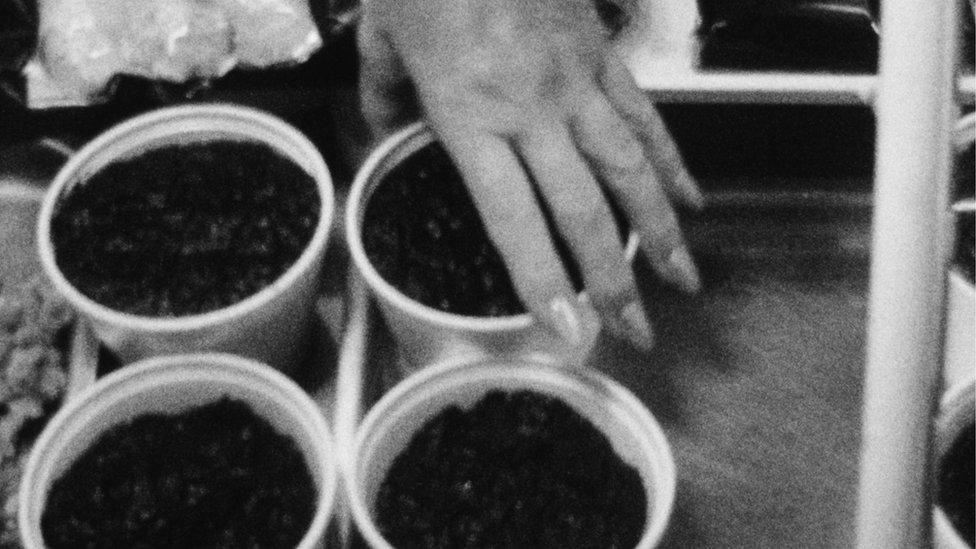
Carol sells laverbread (pictured) alongside cockles
Carol hopes her children and grandchildren will continue the family tradition of working with shellfish and seaweed.
In Carol, Lily sees a "brilliant woman with a devout and unquestionable passion for what she was doing, and a contentment".
"It was really lovely to see how much community [Carol] had in the market. She's been there since she was a little girl," said Lily.
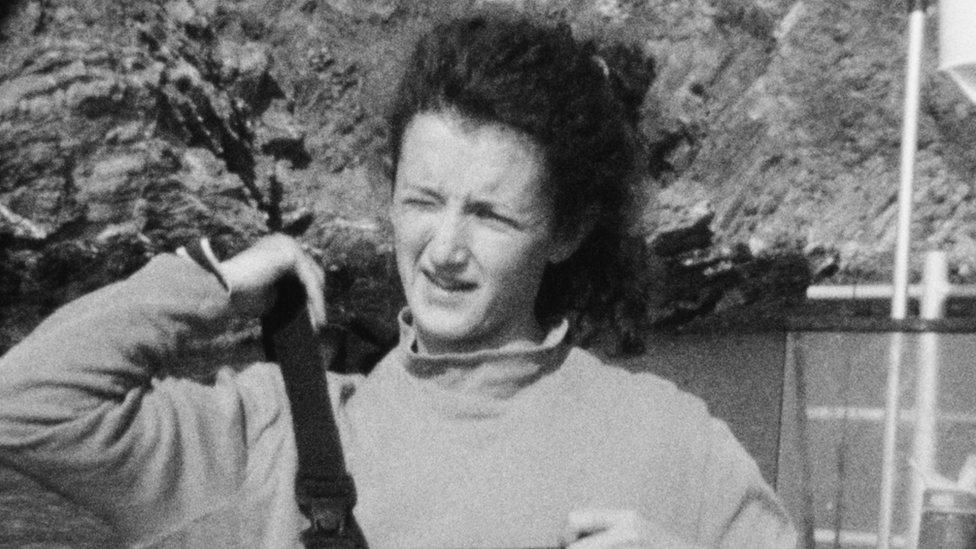
Megan finds working on the water therapeutic
Megan Haines is the co-founder of regenerative ocean farm Câr-Y-Môr (For the Love of the Sea) in St Davids, Pembrokeshire, which grows oysters, mussels and seaweed in a sustainable way.
Their aim is to improve the coastal environment and improve the wellbeing of the local community through job creation, supply of fresh local seafood and environmental restoration.
She spends much of her time out on the water with her father and has a deep understanding of shellfish and their habitat.
"I love it here, it's the most visually stimulating place," she said.
She recalls immediately taking to harvesting seaweed: "I like wild harvesting, there's something quite intuitive about it.
"There's something quite therapeutic about it all.
"You work with the water and over time you just gain this experience and confidence and you can enjoy that as your office."
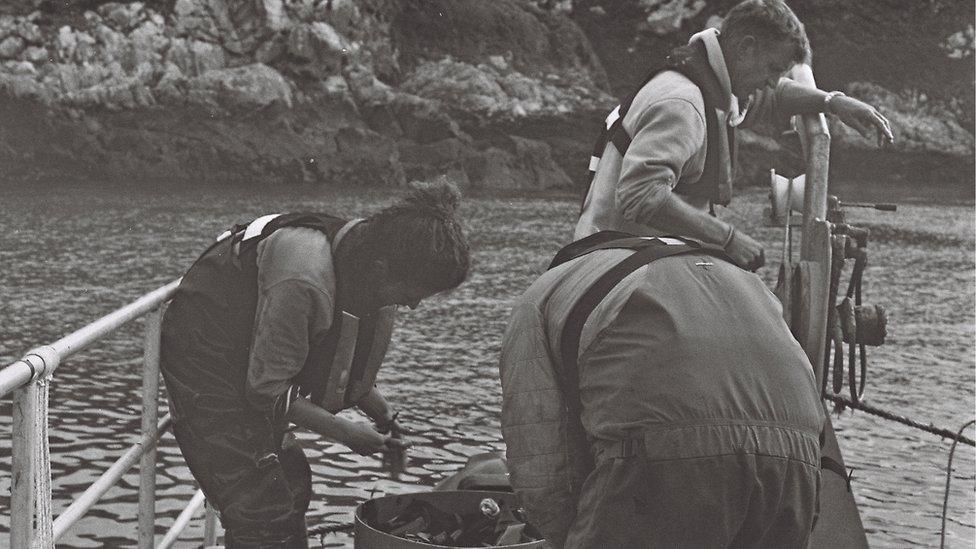
Megan spends much of her time out on the water with her father
Lily sees in Megan a "modern representation of the energy of the cockle women, if that doesn't sound too kind of woo woo," she jokes.
Lily, who grew up in the Teifi estuary village of St Dogmaels, Pembrokeshire, had hoped to develop her film using seaweed for environmental reasons but also to tie into the theme of her film.
Working with seaweed image technician Ed Thomas, she and her cameraman Sion Marshall-Waters were able to develop stills photography in this way but moving images proved too challenging.
Undeterred, she plans to try this technique on future projects.
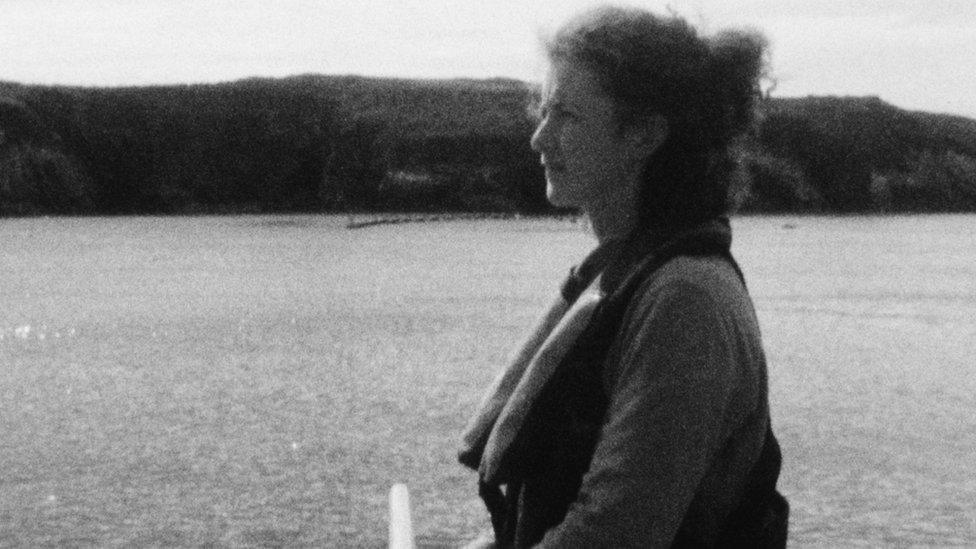
Megan co-founded a company that grows oysters, mussels and seaweed in a sustainable way
But for now she hopes her film demonstrates the "continuation of understanding and respect for the sea", from the cockle women of yesteryear to Carol and Megan today.
She said: "I hope that their way of life comes through in some way and specifically their understanding of the sea."
She Sells Shellfish / Molysgiaid a Menywod y Môr premieres on 28 March at Aberystwyth Arts Centre

COFIWCH DRYWERYN: A new podcast explores a dark and controversial chapter in Welsh history
HEART VALLEY: A day in the life of a curious Welsh shepherd

Related topics
- Published12 November 2022
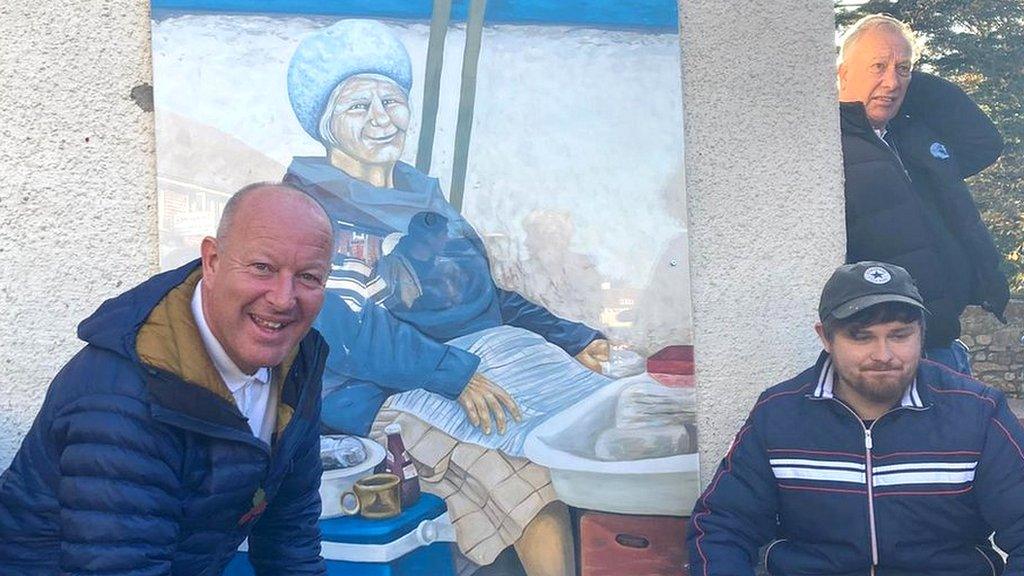
- Published12 January 2020
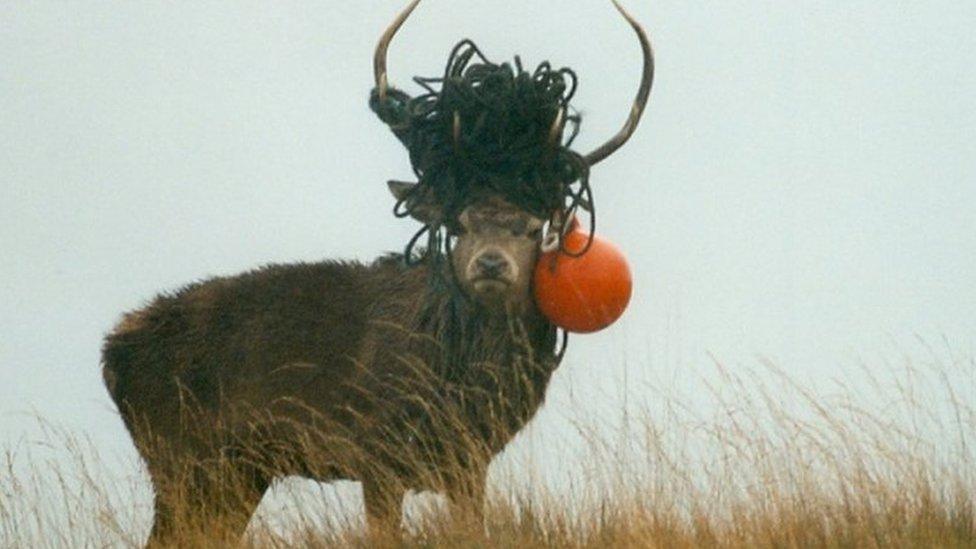
- Published10 May 2013